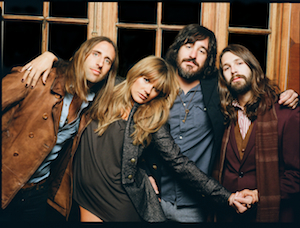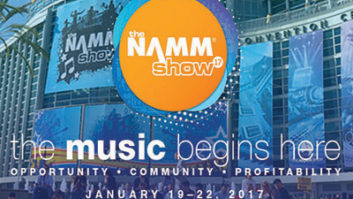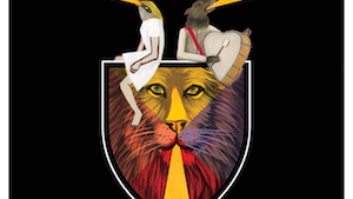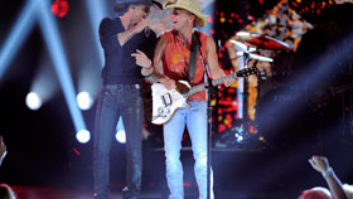
From left: Matt Burr, Grace Potter, Scott Tournet, Benny Yurco
Photo by Lauren Dukoff
Since bursting out of their native Vermont in the mid-’00s, Grace Potter & the Nocturnals have enjoyed a steady rise, as years of relentless touring on the club circuit, playing festivals big and small, and opening for the likes of the Dave Matthews Band, the Black Crowes and, this summer, the Kenny Chesney-Tim McGraw stadium tour, have paid off. They’ve also made four strong albums that showcase lead singer/songwriter/keyboardist Potter’s combustive rock, soul and blues punch, and her band’s flexibility playing everything from power ballads to crunching riff anthems.
For their latest album, titled The Lion The Beast The Beat, after the song that kicks off the disc, the band was looking to capture their live energy in the studio, while retaining a radio-friendly sheen. To those ends they chose veteran producer/engineer Jim Scott (Wilco, Chili Peppers, Tom Petty, Sting) to record and co-produce the album (with Potter), working primarily at his Plyrz Studio in Santa Clarita (north of L.A.), and Rich Costey (Foo Fighters, Springsteen, TV on the Radio, Weezer) to mix at El Dorado Studios in Burbank. Potter also co-wrote three tracks with the suddenly ubiquitous Black Keys frontman/producer Dan Auerbach, one of which was recorded at Easy Eye Sound in Nashville by Colin Dupuis. Engineer Kevin Dean worked with Scott at Plyrz and also on other sessions at the Sunset Marquis Hotel and Westlake Recording in L.A.
Potter connected to Scott on the recommendation of her friends Derek Trucks and Susan Tedeschi “and also the Wood Brothers, who I love and admire,” she says. “Plus, everybody had raved about Jim’s great studio, and it is an unbelievable place. He has gone so far above and beyond to make the place comfortable, groovy and cozy. It’s an epic place to make a record.”
Scott’s studio is tucked inside a 5,000-square-foot warehouse building. The main tracking room is 30×30 with a 14-foot ceiling, while the larger warehouse space, Scott says, “is awesome. It’s not a soundstage; it’s a true industrial warehouse and there are rattles and hums that make it a little undependable day to day. Still, we record in the big room a lot—hand claps and percussion and the odd guitar solo. A lot of drums and percussion were done out there.”
The control room at Plyrz is a gear-head’s dream: It’s based around an immaculately maintained mid-’70s Neve 8048 console and a pair of Neve BCM-10 sidecars (all with their much-coveted pre’s and EQs); KRK E8T and ProAc loudspeakers; and both classic and more modern outboard gear from UREI, dbx, UA, Neve and others. The studio has an excellent microphone collection and scads of musical instruments, amplifiers and such. “They used my drums, my amps; they brought some guitars but not all,” Scott notes. “That’s the service you have to provide these days. People can’t afford to ship gear across the country anymore. Grace played my piano and the organs that we have here.”
It was tracked almost entirely live, everyone in the room, though vocals were mostly added later. “Her scratch vocals are unbelievable,” Scott says. “I think there are a couple that went the distance, they were so great. But we also did a lot of vocals later, too.” The vocal chain was a 1970 Neumann U 87 into a Neve 1081 and “a blackface 1176 I’ve had forever. We did vocals at the studio, but we also set up a mobile studio down at the Sunset Marquis, and the only change there was I used the [Neve] 1073 because that’s what’s in my Neve sidecar. She’s a trooper, man. She’ll sing 12 hours a day—just stand there and lead the band: ‘Okay, back to the chorus; ready, two, three, four—go!’ and blast out the chorus at the top of her lungs all day long. It’s impressive. She’s got a real instrument.”

Grace Potter and Jim Scott
According to Potter, it took awhile to determine the musical direction for the album. “I didn’t really know where we were going at the beginning of the record,” she says. “It’s something that really took a toll on me because I was letting all the pressure that was coming from me get to me. There were also outside influences of people who thought the record should sound like one thing or another thing, but at the heart of it, my dissatisfaction with the song selection was a major piece of what made me eventually take the reins and say, ‘I need to be more in control of my destiny here. I have to stop letting other people drive the car.’
“The Dan co-writing experience was part of the catalyst for me re-assessing the entire album—not because I thought the Dan songs were so much better. It was that I realized there was a deeper possibility for this record and a more ambitious direction for this record to go in.
“We had all these kind of country-ish songs I had co-written in Nashville. I had so many ideas on the table, I couldn’t decide what direction I wanted to go in. And the band was waiting with baited breath, and they were so patient with me through this time. Are we going to make a country record or a rock record? Are we going to make a cool, hip soul record with dance-y songs? Or are we going to make an epic f—n’ opus? I think we ended up doing a little of all of that, with very careful selection and a lot of thought put into exactly what message I wanted to send lyrically and musically.”
The Nocturnals comprise lead guitarist Scott Tournet, drummer Matt Burr, guitarist Benny Yurco and new bassist Michael Libramento, who joined the band during the album sessions. In fact, at the beginning, Tournet and Yurco took turns playing bass. “We have five people in the band,” Potter says, “and everybody has their own idea of epic-ness and beauty in music, and I wanted to address that on this record. I wanted to give everybody a voice—not just my own personal taste, but five people’s ideas of what a great record is.
“It was very collaborative, from Jim Scott creating unbelievable engineering sounds that took it to another level, to David Campbell arranging the orchestrations, to Rich Costey mixing the shit out of it, to Dan Auerbach, who brought his unbelievable quirk-rock into it. It was a journey from beginning to end, closing out with me and my band being really proud of it, which is something that doesn’t always happen.”
Click here for an extended interview with Jim Scott and Grace Potter.






